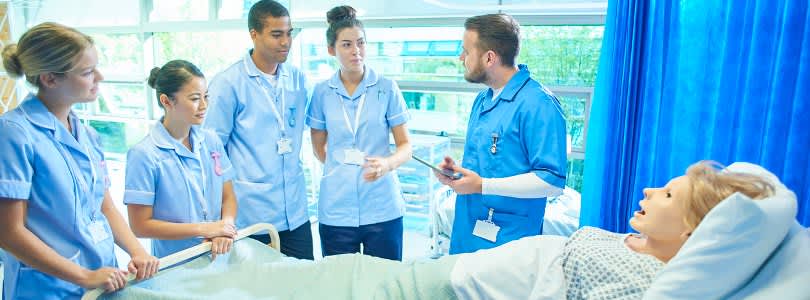
In most cases, students in an online graduate nursing program can expect to complete the majority of their coursework remotely over the web. This includes viewing lectures, participating in class discussions, and working on assignments entirely online. However, many programs require online nursing students to make one or more trips to campus over the course of their studies, either to take part in orientation events or hands-on training intensives. These campus-based sessions are a great opportunity for students to meet their classmates and instructors in person, or, as is often the case, hone the clinical skills they have been learning throughout the program. Despite these benefits, the cost and time required to visit campus may be perceived as a negative by some prospective online students, especially those who do not live within driving distance of the schools they are considering.
We interviewed alumni of several prominent online MSN and DNP programs to find out how they felt about their required campus visits. While it is easy to see how travelling to campus would be an inconvenience for some, the majority of graduates we spoke with found these campus-based sessions extremely beneficial to their studies, and a welcome addition to the online program. Along with enjoying the opportunity to socialize with classmates and faculty, most deemed the on-site skills workshops and assessments absolutely necessary to their graduate education. Even those who initially viewed the requirement to visit campus as a drawback left their program feeling it enhanced their learning experience and better prepared them for the realities of working as an advanced practice registered nurse.
To read what the graduates had to say about their campus visits, and learn more about what to expect in these on-campus sessions, check out the following excerpts from our interviews.
What Online Nursing Students Should Know About Campus Sessions
 Marla Capes, MSN, ARNP – Duke University
Marla Capes, MSN, ARNP – Duke University
“While the idea of going to campus seemed daunting at first because there were several three day weekend requirements, I am so glad that the on-campus weekends are mandatory. Three of the weekends were during the semester of physical assessment and we practiced on live models one weekend, and learned how to perform a thorough physical assessment in pieces throughout the semester. The final weekend that semester was a complete assessment that was graded on campus. This made me feel so much more confident in what I was learning and that I was applying the information and performing assessments appropriately.
Another weekend was during women’s health and we learned how to insert IUDs, perform thorough breast exams, and other extremely important lessons that cannot easily translate over PowerPoint lectures. These on-campus sessions were extremely helpful in applying material, getting to know other students that previously I had only interacted with via discussion boards or group projects, and meeting faculty in person. It made me more confident as I was developing NP assessment skills. These weekends incorporated throughout the program ended up being my favorite part of the program.”
(Read the full interview with Ms. Capes here)
 Michaela Klose MSN, APRN, FNP-BC, NP-C – Gonzaga University
Michaela Klose MSN, APRN, FNP-BC, NP-C – Gonzaga University
“As the number of nursing programs in the U.S. offering distance education for nurse practitioner students has grown, challenges of evaluating student clinical performance have become apparent. So while researching potential programs, the idea of visiting the campus was an absolute requirement for me. I wanted a program that could identify early in my clinical courses if I was struggling with clinical skills or had weaknesses. There are so many online programs that do not have hands-on education and leave their students to learn from preceptors. I wanted to make sure I was learning the correct way of assessing, diagnosing, and planning for a patient. I felt that this requirement was an absolute enhancement for the program.
During my on-campus immersions, we completed one OSCE [objective structured clinical examination] at two separate times each semester, with generally 6 to 8 weeks between the two OSCEs. Each OSCE was conducted within a 30-minute timeframe with scripted model patients and a nurse educator. The case scenarios were designed to assess eight clinical skills: (a) history taking; (b) physical examination technique; (c) physical examination knowledge; (d) identification of abnormality; (e) differential diagnosis; (f) patient interaction; (g) patient presentation; (h) written documentation of encounters. In addition to these immersions, we learned how to do pap smears and testicular exams. In labs we learned how to perform IUD placement, punch biopsies and suturing. Although extremely stressful at the time, I truly feel this was an absolute benefit of the program and it was so rewarding to know I passed the hardest exams and OSCEs. It was because of these immersion weekends I am better prepared professionally and didactically than most FNPs that didn’t have this opportunity.”
(Read the full interview with Ms. Klose here)
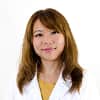 Julie Jean, MSN, FNP – Texas Tech University Health Sciences Center (TTUHSC)
Julie Jean, MSN, FNP – Texas Tech University Health Sciences Center (TTUHSC)
“When I was comparing online programs, I considered the number of campus visits that would be required. The University of Texas at Tyler required campus visits at least once a month. TTUHSC required campus visits once a semester in the second half of the program. Texas A&M at Corpus Christi required no campus visits at all. I wanted a program that included at least some campus visits so that I could meet my instructors in person, demonstrate my clinical skills, and get structured feedback. However, I could not spare the time or expense of driving 8 hours every month to spend several days on campus, as UT-Tyler would have required. Therefore, TTUHSC was a happy compromise.
On-campus visits occurred in the last five semesters of the program, when students were in the clinical courses. Students had access to TTUHSC’s state-of-the art simulation center, where we could practice conducting focused physical exams on prosthetic body parts. Most of the on-campus visits included Objective Structured Clinical Examinations (OSCEs), in which students demonstrated what we learned on real patients in a simulated exam room setting. After OSCEs, we met in small groups for seminars on topics relevant to nurse practitioner licensing and practice. There was also one on-campus lab that covered procedures such as suturing and casting, and was very beneficial.”
(Read the full interview with Ms. Jean here)
 Jerry “Bo” Barton, MSN, FNP-C – Troy University
Jerry “Bo” Barton, MSN, FNP-C – Troy University
“The requirements for the once a semester physical class meetings and/or labs included practicing head-to-toe assessments on mannequins and testing props. Once those assessments were completed, students were then required to perform physical head-to-toe assessments on other students while being graded by a faculty member. Also, throughout these meetings, students were required to provide feedback on a unique patient experience from the clinical rotation during that semester. For our research projects, students were also required to complete a poster presentation on our research topic, as well as be prepared to answer questions regarding the research.
I believe these hands-on requirements enhanced the learning experiences of Troy University’s online program by allowing me to put online learning into practice, while gaining immediate feedback and instruction from faculty members. These opportunities also allowed me the chance to meet other students in person, to assess and compare my clinical experiences to theirs, as well as learn vicariously through their experiences.
While researching Troy University, I was pleased with the idea of attending a group meeting once a semester. However, I did not initially realize just how valuable the experiences would be until I compared my retention of the content and knowledge to other students. It was hugely beneficial to see just how much I truly was learning via Troy University’s online methods.”
(Read the full interview with Mr. Barton here)
 Michelle Lew, MSN, FNP – Gonzaga University
Michelle Lew, MSN, FNP – Gonzaga University
“Each semester required a two day campus visit. One of these days would be labs where you could practice hands-on skills. The other day was reserved for testing. In terms of labs, we were given the opportunity to practice full head-to-toe assessments, genital exams, insert IUDS, apply different types of splints, learn how to suture, and do biopsies. We also role played different scenarios that one would encounter while in practice. One of the tests that was done on these campus visits had the student play the role of the nurse practitioner seeing a patient for a specific case. You get to interact with your patient as if they were real to gather history, perform an exam, and make a diagnosis. At the end, you are asked about your thought process during this scenario and how you came to your diagnosis.
I felt these campus visits were extremely important in this type of program. While researching other programs, I wanted to choose one that has campus visits that I could go to without taking time off of work. Gonzaga’s campus visits were usually on a Friday and Saturday. These campus visits allow the instructor to get a sense of your skills as a clinician and help you improve in your weak areas so that one can be a better clinician. I also appreciated the labs with real models to practice my skills on and receive feedback.”
(Read the full interview with Ms. Lew here)
 Amanda Davis, MSN, ARNP, FNP-C – Duke University
Amanda Davis, MSN, ARNP, FNP-C – Duke University
“When initially researching potential programs, the on-campus intensives were considered to be a downfall, as these meetings would increase my cost of attendance based on travel expenses. However, after speaking to faculty at Duke, I realized the rationale for these intensives and felt they would enhance my education — which proved to be absolutely true.
Each intensive brought different experiences, all of which were fruitful and necessary. One intensive allowed us to work with standardized patients to have hands-on experience with pelvic and prostate exams — something we would not have been able to experience without these intensives. Other experiences were completed in the simulation lab, allowing us to practice procedures prior to performing them in clinical, thus improving healthcare outcomes for those we served in clinical.”
(Read the full interview with Ms. Davis here)
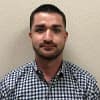 Judson Lawrence MSN, FNP-C – Texas Tech University Health Sciences Center (TTUHSC)
Judson Lawrence MSN, FNP-C – Texas Tech University Health Sciences Center (TTUHSC)
“The first time I stepped foot on the campus was for the required orientation, which helped inform us of what was expected. They had a very strong emphasis in obtaining preceptors for the individual clinical courses as that seemed to be where most struggled. Texas Tech had two ladies whose sole job was to help us with obtaining contracts with sites and clinical instructors, and seemed to work tirelessly in completing these.
The second time I was required to come to the campus, which by the way was an 8 hour drive, was for hands-on training, which included radiology classes, suturing and other procedures as well as SIM lab training. This course was prior to any of the clinical components, therefore I feel Texas Tech better prepared myself and my colleagues for clinicals than any other university.
Once clinical courses began, we were required to attend a check-off on assessments, exams and diagnosing that was videoed by our preceptors. This was once a semester and was incredibly helpful in fine-tuning my assessments and in how I approach patients. This was just another example of how Texas Tech’s program was set apart from other programs. I cannot tell you how many times I was complimented by my clinical preceptors on how well prepared I was for clinicals.”
(Read the full interview with Mr. Lawrence here)
 Paula Coffman, DNP, APRN, FNP – University of South Alabama
Paula Coffman, DNP, APRN, FNP – University of South Alabama
“For the Family Nurse Practitioner track, we had one on-campus intensive that occurred during the semester we started clinical. The intensive was well organized and informative in preparing for clinical. They lasted approximately four days. They had hands-on experience classes for suturing, punch biopsy, drainage of abscesses, pap smears, and other clinic procedures. They also provided practical knowledge on prescribing medications, coding, and handling sensitive situations. The location of the intensive was close to nice hotels, restaurants, and shopping, making it easy for family members to come along.
I would say the on-campus sessions enhanced the program since it gave us hands-on experience and education on how to be a family nurse practitioner. It also allowed us to meet our instructor and classmates in person. I considered a one-time intensive a pro to the online program. Many institutions require several visits to their campus. Living several hundred miles away would make it difficult to travel to campus several times.”
(Read the full interview with Dr. Coffman here)
 Christine Kloby, MSN, CRNP – Drexel University
Christine Kloby, MSN, CRNP – Drexel University
“The on-campus visits were a great addition. We were able to meet the faulty members and other classmates in person. During these visits, we learned skills such as abscess drainage, suturing, and IUD placements. They had live actors that simulated patients that we would see as practicing nurse practitioners. These actors were incredibly comfortable with their bodies and using them as a teaching tool. This is where I performed my first vaginal and rectal exam and learned what to look for on these exams. It was a really rewarding experience. There were also classroom sessions along with the labs. I felt these on-campus sessions enhanced the program immensely.
When researching potential MSN programs, the requirement to visit the campus was actually a con for me. I didn’t want to be inconvenienced to have to travel out of state, rent a hotel room, and pay additional expenses. However, after experiencing this, I would do it over again. It was a good opportunity to get to know my classmates and faculty, have an excellent hands-on learning experience, and see a beautiful city.”
(Read the full interview with Ms. Kloby here)
 Rebecca Singh, MSN, FNP-BC – Duke University
Rebecca Singh, MSN, FNP-BC – Duke University
“At the beginning of the program, intensives included advanced assessment and clinical reasoning skill testing as well as case study discussion groups. The skill testing included (for example) performing a head-to-toe physical exam on another student in front of an evaluating instructor and interviewing an instructor posing as a patient based on their presenting complaint while being graded by another instructor.
Later in the program we had more skill workshops. Examples of these workshops include live male and female models for prostate and vaginal exam experience as well as plastic models for IUD insertion. There were varied skill workshops all of which I found useful to have prior to showing up at my clinical sites.
I found the on-campus time extremely constructive both for learning new clinical skills and also developing relationships with the other students and professors. An on-campus component is also valuable for the integrity of the program and quality control. It allows in-person faculty assessment of skills prior to sending students into the clinical setting.”
(Read the full interview with Ms. Singh here)
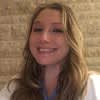 Jamie Kulick, DNP, CNM – Frontier Nursing University
Jamie Kulick, DNP, CNM – Frontier Nursing University
“I enjoyed meeting with my cohort and instructors on campus. The first meeting on campus (Frontier bound) prepares you for what you are about to undertake which is a good thing to do, you get to meet your faculty and fellow classmates, you know these are real people who care about you and your learning. The second meeting on campus is for Clinical bound. There are labs and skills checks, these are live exams. Before you go and complete your clinicals, you get evaluated by your instructors so you know you are ready and fully prepared for the clinical portion of the program. You get hands-on training on suturing, physical exams, work with mannequins and live volunteers for exams.
I enjoyed going to the on-campus intensives, at first I was not happy about having to travel there, but I am really glad they had this requirement. I got so much confidence and necessary skills from these meetings. I also got to meet my instructors live which elevated my online learning experience because I felt connected with them more.”
(Read the full interview with Ms. Kulick here)
 Monika Duitch, DNP, APRN, AGNP-C – Duke University
Monika Duitch, DNP, APRN, AGNP-C – Duke University
“The on-campus sessions were excellent for learning hands-on skills, and for in person didactic and group work. As a student I was able to gain clinical pearls from seasoned practitioners to incorporate into my practice. Often these sessions included individual instruction or work in a very small group where we could each gain 1:1 attention. This specific focus was tailored to build on/improve my personal skill set, and not a generic blanket instruction.
Probably my favorite session was for Dr. Short’s Nursing Policy class as a DNP student. Students presented current legislative topics pertinent to healthcare reform to important community and state leaders. The exercise increased awareness of current trends in legislation involving patient care, improved my ability to critically appraise current evidence, and enhanced my leadership and presentation skills to connect the gaps in practice for better patient care.”
(Read the full interview with Dr. Duitch here)
 Alex Lawrence, MSN, FNP-C – Texas Tech University Health Sciences Center (TTUHSC)
Alex Lawrence, MSN, FNP-C – Texas Tech University Health Sciences Center (TTUHSC)
“We travelled to Lubbock, TX nearly every semester during the entirety of the program. The first visit, after orientation, included hands-on training involving suturing, radiology interpretations, and clinical assessments. Texas Tech University Health Science Center’s SIM lab is impressive, and is available at no charge to any students who want to use it at the main campus or in Abilene. The first visit to Tech was informative and invaluable. After discussing our experience with other NPs and students, it was clear that Texas Tech is the only program that offers this experience.
Other visits to the campus included an On-Site Clinical Evaluation, where we would obtain an HPI, physical examination, diagnosis, and treatment to hired actors. Our preceptors monitored our performance through a video in the room. After 3-5 assessments, we reviewed the video with our preceptor who critiqued our performance. These were very helpful in improving assessments.”
(Read the full interview with Ms. Lawrence here)
 Deven Robinson, MSN, APRN, PMHNP-BC – Gonzaga University
Deven Robinson, MSN, APRN, PMHNP-BC – Gonzaga University
“Gonzaga’s program of activities on campus were definitely a pro/plus to the MSN program. While attending Gonzaga’s program, the limited campus visits were intensive, and I was able to learn a lot of assessment skills, orthopedic skills, and also complete OSCE, to make sure we were obtaining the needed clinical assessment skills and treatment for patient care. Also included in these weekend intensives were well woman exams, dermatological procedures, radiology readings skills, and other clinical skills. I chose Gonzaga’s program partly due to these on-campus sessions, which I felt helped me succeed better as a FNP.”
(Read the full interview with Mr. Robinson here)
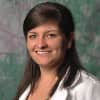 Leigh Montejo, DNP, FNP-BC – Duke University
Leigh Montejo, DNP, FNP-BC – Duke University
“The executive format of the Duke’s DNP program requires that students, staff, and educators be present for on-campus sessions four times during the program. This was a requirement that also attracted me to enrolling in the DNP program at Duke. Prior to my DNP, I had not engaged in an academic program that was only offered in a virtual format, and thought that the on-campus requirement would offer some of the support that came with the traditional programs I had been used to.
Additional educational opportunities for learning and collaboration were provided during the on-campus sessions. During one of these sessions, we were given the opportunity to engage in an advocacy discussion with a panel of experts in policy. Some panel members held offices on the North Carolina legislature. This provided an opportunity to actively engage, influencing the decisions of policymakers towards evidence-based changes. Various presentations were expected to be delivered during these sessions as well, which allowed for continued practice on public speaking, dissemination of research, and active question-and-answer sessions in structured format. Additionally, during the on-campus sessions, there was time for collaboration and informal discussion. Lunch was often provided and it was encouraged to share these meals with faculty, staff, and other students.”
(Read the full interview with Dr. Montejo here)
